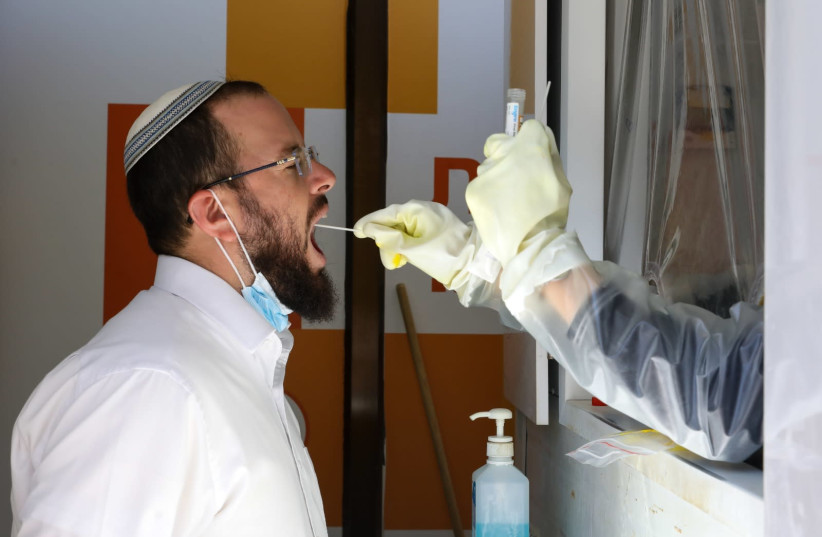Israel sees 30% spike in daily COVID cases, Health Ministry says
The Health Ministry instructed hospitals in Israel to begin conducting PCR tests on new patients for the next week due to a recent rise in novel coronavirus (SARS-CoV-2) cases on Monday.
Last week, 136 new cases were reported on average each day, compared to 104 new cases each day two weeks earlier, according to data from the Health Ministry. Meanwhile, the number of hospitalized patients with COVID-19 decreased in recent days, with 42 patients in serious condition and 20 in moderate condition as of Sunday.
The Health Ministry noted that most of the cases in Israel are being tested with home tests or non-lab tests, making it harder for officials to track infection rates. The decision to require PCR tests in hospitals will allow health officials to more effectively track the infection rates.
Health officials keeping an eye on BA.2.86 variant
The increase in cases comes as health officials across the world track the spread of the BA.2.86 variant (colloquially referred to as “Pirola”) of the coronavirus.
Samson Assuta Ashdod University Hospital announced on Monday that BA.2.86 accounted for over 16% of cases in Israel as of Sunday night based on Health Ministry data.
 Israeli receiving a COVID test at Meuhedet Health Maintenance Organization center in Jerusalem on August 11, 2021. (credit: MARC ISRAEL SELLEM)
Israeli receiving a COVID test at Meuhedet Health Maintenance Organization center in Jerusalem on August 11, 2021. (credit: MARC ISRAEL SELLEM)The variant has dozens of mutations, with initial studies finding that BA.2.86 is able to evade much of the immunity provided by previous infections and vaccinations, but has a harder time spreading between people.
Immunologist Yunlong Richard Cao reported that experiments examining how the virus interacts with various antibodies found that it could avoid antibodies provided by older variants, including the more prevalent XBB.1.5 variant. XBB.1.5 is being used as the basis for a new coronavirus vaccine booster set to be used this fall.
In sum, we found that BA.2.86 is antigenically distinct from XBB.1.5 and can escape XBB-induced neutralizing antibodies. The updated vaccine’s efficacy against BA.2.86 should be closely monitored; however, BA.2.86 may not prevail very fast due to its lower infectivity. (7/n)
— Yunlong Richard Cao (@yunlong_cao) August 31, 2023
Cao noted that the experiments also found that BA.2.86 is less infective than than XBB.1.5 and EG.5 variants, due to a number of mutations it contains.
“In sum, we found that BA.2.86 is antigenically distinct from XBB.1.5 and can escape XBB-induced neutralizing antibodies,” wrote Cao. “The updated vaccine’s efficacy against BA.2.86 should be closely monitored; however, BA.2.86 may not prevail very fast due to its lower infectivity.”
A different study of immunity by a team led by researchers Ben Murrell and Daniel Sheward found that blood samples from before and after the emergence of XBB variant found that the samples from after XBB were “substantially better” at neutralizing BA.2.86.
The pre-XBB samples were poor at neutralizing BA.2.86 (and not much better against XBB.1.5). But, somewhat encouragingly, last week’s samples were substantially better, with 8 out of 12 neutralizing BA.2.86 at titers over 100. pic.twitter.com/jmVdKRw2Sy
— Ben Murrell (@BenjMurrell) September 1, 2023
Scientists have noted that, so far at least, there are no signs that the illness caused by BA.2.86 is any more severe than other recent variants.
Variant appears to be spreading closely although situation remains unclear
The variant also does not appear to be spreading quickly, although some researchers have stressed that it could take longer for it to reach its peak infection rate.
Molecular virologist Marc Johnson noted that Delta also spread slowly before hitting “critical mass” and spreading quickly across the globe.
Shay Fleishon, executive director at BioJerusalem and a former advisor to the Central Virology Laboratory at Sheba Medical Center, noted that BA.2.86 may not actually be spreading that slowly compared to BA.2 and a version of the Delta variant. The perception of it spreading slowly made be due to comparisons to BA.1, which spread unusually fast, according to Fleishon.
Excellent point by @SolidEvidence – does BA.2.86 actually slow? So I analyzed the initial samples of BA.2.86, BA.2, and Delta 21J (searched by their unique mutational patterns). The data suggests that BA.2.86 is not that slow to proliferate, even without accounting for current… https://t.co/6pAAFeNEZb pic.twitter.com/sYOSJeexoH
— shay fleishon (@shay_fleishon) August 31, 2023
Fleishon theorized as well that the relatively slow increase in confirmed tests of BA.2.86 may be more indicative of low surveillance efforts worldwide and not of the variant’s lack of success. Fleishon pointed to the quick spread of the variant across multiple countries in distant locations in a relatively short timeframe as an indicator that the variant may be more successful than it appears to be.
Decreased surveillance has also made it difficult to accurately judge how quickly BA.2.86 is spreading and is posing difficulties in catching future variants.
It’s easy to forget, but in spring 2021, many were arguing we didn’t need to worry about Delta because the first sequences had appeared months before. If Delta was a real threat, they argued, it should have swept the field in the intervening months. https://t.co/glMVYBj12H
— Ryan Hisner (@LongDesertTrain) August 30, 2023
“The fact…that another Omicron-like emergence event has occurred, with that long unobserved branch and subsequent spread, should warn us against giving up our genomic surveillance infrastructure,” wrote Murrell on X (formerly Twitter).





Comments are closed.